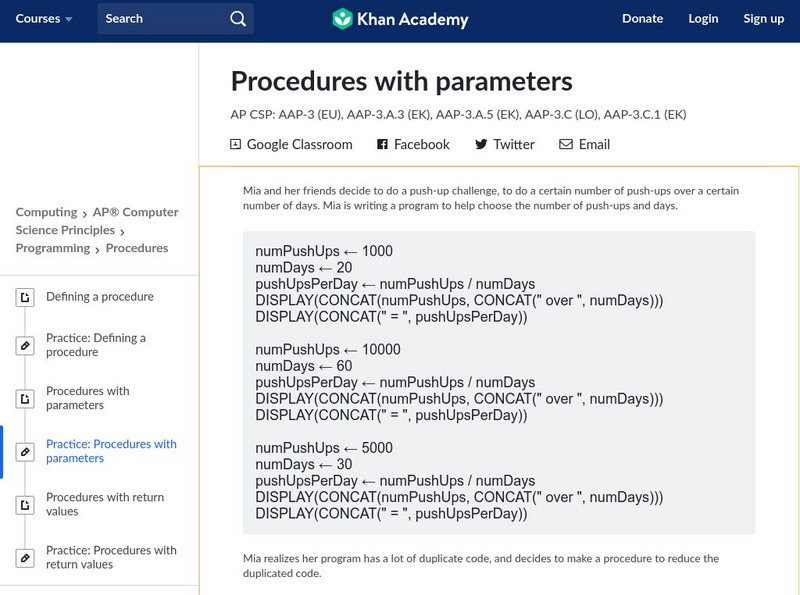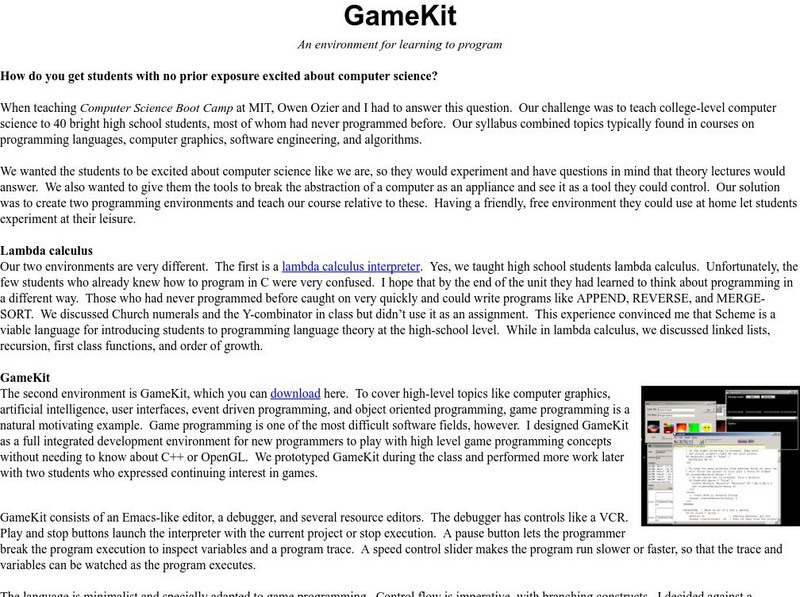Khan Academy
Khan Academy: Conditionals With If, Else, and Booleans
A tutorial explainning the use of if, else, and Boolean logic in computer programming.
Khan Academy
Khan Academy: Nested Conditionals
Learn how nested conditionals work in computer programming.
Khan Academy
Khan Academy: Compound Booleans With Logical Operators
Learn about computer programming using compound booleans with logical operators.
Khan Academy
Khan Academy: Procedures With Parameters
Practice using procedures with parameters for computer programming.
Khan Academy
Khan Academy: Number Limits, Overflow, and Roundoff
Learn about the limitations of storing numbers in computer programming.
Code.org
Code.org: Cs Fundamentals: Course A
Learn the basics of computer science and internet safety. At the end of the course, create your very own game or story you can share.
Code.org
Code.org: Cs Fundamentals: End of Course Project
This lesson provides students with space to create a project of their own design, using a step-by-step process that requires planning but also allows for broad creativity.
Brown University
Brown University: Game Kit
An environment for learning to program, this guide will help educators foster computational thinking for students in computer science classes.
Other
Code Monkey: Learn Real Coding
CodeMonkey is an engaging online game that teaches real computer programming to children as young as 9.
TryEngineering
Try Engineering: Program Your Own Game
Teams of young scholars learn about the work of software engineers as they design a simple computer game using free software available in multiple languages.
TED Talks
Ted: Ted Ed: Inside Your Computer
How does a computer work? The critical components of a computer are the peripherals (including the mouse), the input/output subsystem (which controls what and how much information comes in and out), and the central processing unit (the...
Goodwill
Gcf Global: Computer Science: Sequences, Selections, and Loops
Learn more about sequences, selections, and loops.
Carnegie Mellon University
Carnegie Mellon University: Programming Language Research
This site contains a listing of compiler topics and their links as well as related sites.
TeachEngineering
Teach Engineering: How Do You Make Loops and Switches?
Learners learn how to program using loops and switches. Using the LEGO MINDSTORMS NXT robots, sensors and software, student pairs perform three mini programming activities using loops and switches individually, and then combined.
Yale University
The Wit and Wisdom of Grace Hopper
Quotes from Grace Hopper, a pioneer in computer programming.
Code.org
Code.org: Cs Fundamentals: Course D
Students develop their understanding of loops, conditionals, and events. Beyond coding, students learn about digital citizenship.
Code.org
Code.org: Cs Fundamentals: Lesson 10: Loops With Rey and Bb 8
Building on the concept of repeating instructions from "Getting Loopy," this stage will have students using loops to help BB-8 traverse a maze more efficiently than before.
Khan Academy
Khan Academy: Conditionals With If, Else, and Booleans
Learn how omcputer programs also make decisions, using Boolean expressions (true/false) inside conditionals (if/else).
Khan Academy
Khan Academy: Mathematical Expressions
A computer can compute results for them in a fraction of a second. Find out how we actually get the computer to do math for us?
Khan Academy
Khan Academy: Storing Data in Variables
Find out how computer programs instruct computers how to process data.
Khan Academy
Khan Academy: Random Numbers
See how we can generate random values in our computer programs, and use those to make decisions and simulate natural processes.
Khan Academy
Khan Academy: String Operations
Computer programs don't just store strings, they also manipulate them. With string operations, we can chop strings up, mash strings together, or transform strings in all sorts of ways. Learn how here.


















